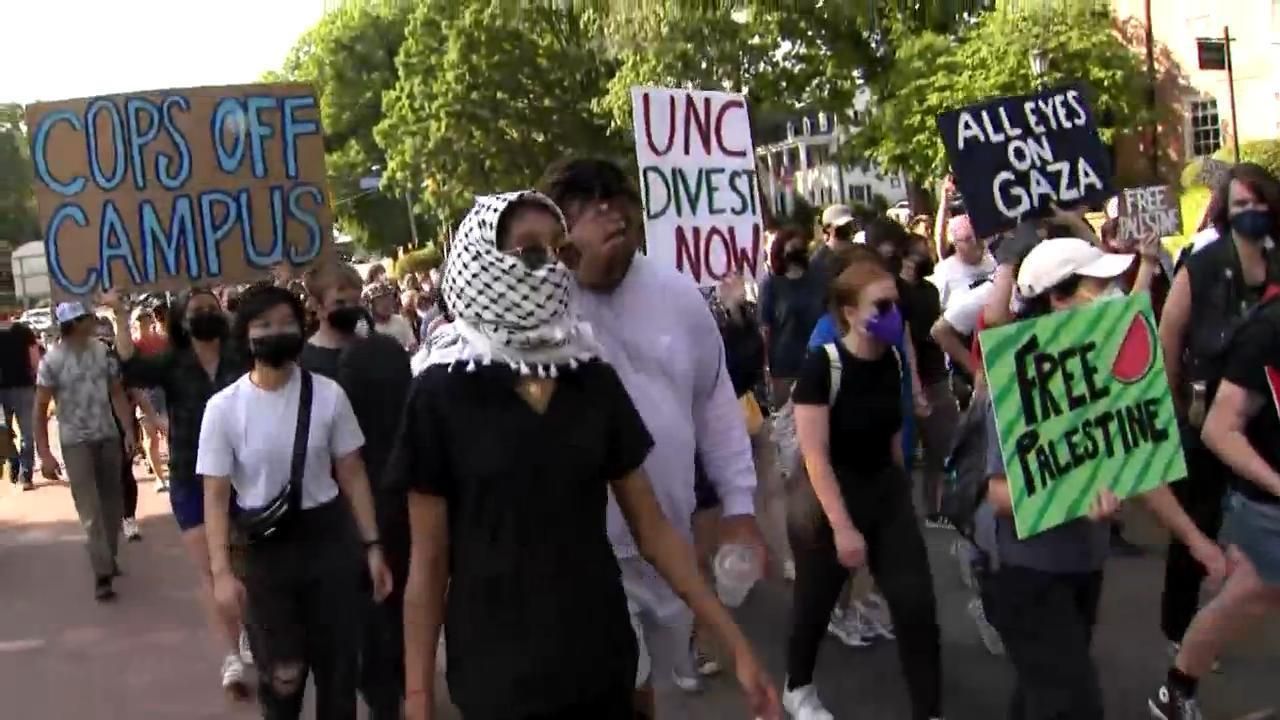Protesters who wear masks or block traffic should face harsher penalties: NC lawmakers

North Carolina lawmakers are proposing a new law to crack down harder on protesters who block highways or wear masks — a measure that comes as protests over the Israel-Hamas conflict pop up on campuses across the country.
The idea met no resistance Tuesday when it was first made public in a state Senate Judiciary Committee meeting. No lawmakers from either party, or members of the general public, asked any questions or made any comments about the bill.
Sen. Buck Newton, R-Wilson, is the bill’s sponsor. He told reporters after the meeting that he was surprised nobody had anything to say about it — but that he did expect to hear more in the future. Tuesday’s meeting was for discussion only, meaning that the committee will have at least one more meeting to debate and vote on the bill, which Newton titled "Unmasking Mobs and Criminals."
It has been a crime since the 1950s to wear a mask in public in North Carolina. But the state has also created a list of various exceptions to that law, which was expanded during the Covid-19 pandemic to include “any person wearing a mask for the purpose of ensuring the physical health or safety of the wearer or others.” Newton’s bill would delete that language, although he said he thought other state laws might still protect people who have a legitimate medical need to wear a mask.
Newton told reporters he believes some people are exploiting Covid-era social norms of mask-wearing, as an excuse to hide their identities.
“This isn’t just about the protests,” he said. “I think it’s clear people are seizing the opportunity to do things they’re not supposed to do, to break the law or to intimidate people, and keep their identities hidden. It’s time for that to stop.”
The bill, an amendment to House Bill 237, would require judges to hand down harsher-than-normal criminal sentences for people who commit any crime while wearing a mask. That could include anyone from bank robbers to protesters convicted of trespassing or littering.
The bill would also create a new crime specifically for protests that block roads — a tactic some recent Black Lives Matter and pro-Palestinian protests have engaged in during demonstrations in Durham, Raleigh and across the nation.
It’s currently a low-level misdemeanor for anyone to stand, sit or lie on a road to fully or partially block it. Newton’s proposal would keep that in place while also creating a new, more serious crime specifically targeting protesters who take part in “a demonstration intended to prohibit or impede the use of the highway or street.”
That new crime would be punishable by either the highest level of misdemeanor or by a felony, depending on the details, for someone's first offense. Repeat offenders would be guaranteed to face felony charges.
The bill also proposes that if someone dies or is injured due to a protest blocking emergency vehicles from getting through, the person who organized the protest can be sued and held civilly liable — forced to pay damages, even if they weren’t physically present at the protest.
“We want to preserve the right for people to protest under the First Amendment, but people have to do so in an orderly way,” Newton said, later adding: “Impeding an emergency vehicle — an ambulance, a fire truck — for public safety reasons, we just can’t tolerate that.”
Follows 2023 anti-riot law
The proposal is part of a larger trend of state lawmakers attaching new felony charges to previously low-level crimes associated with protests. Critics call it an attempt to scare people away from protesting in the first place.
Republican lawmakers passed a related law last year, in face of opposition from First Amendment advocates and some Democrats, that increased penalties on protesters who engage in property damage and allows anyone arrested during a protest, even for minor charges, to be held behind bars without bail for 24 hours.
GOP leaders said it was a direct response to the Black Lives Matter protests of 2020. They also tried passing a similar law in 2021, but Democratic Gov. Roy Cooper vetoed it. Cooper didn’t veto the 2023 version after several Democrats in the state legislature voted for it.
That new law also could allow both civil and criminal legal action against people who help organize or encourage a protest that later includes any acts of violence against people or property, even if they themselves weren’t involved.
The American Civil Liberties Union has sued to overturn it as unconstitutional, calling it “a flagrant attempt to vilify and criminalize a social justice movement.”














